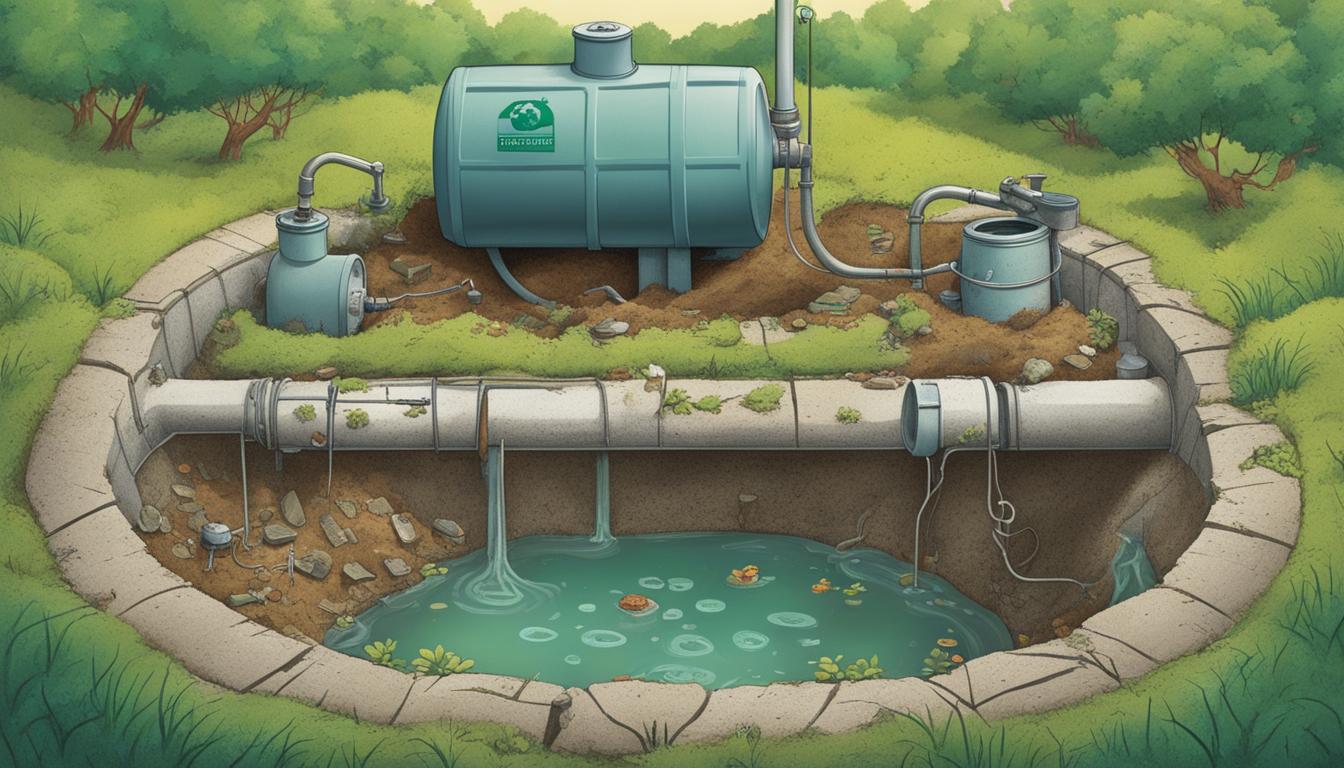As responsible citizens, it is imperative that we look beyond the immediate benefits of any product or service, to identify any long-term impacts on the environment. The same applies to septic system additives, which are used to improve the performance of septic tanks by breaking down waste, reducing odors, and controlling the buildup of sludge. While these additives may seem like a practical solution, we need to understand their impact on the environment before using them.
In this article, we will conduct an exploratory analysis of septic additives’ impact on the environment. We will delve into the potential environmental consequences of septic system additives, analyze the influence of green septic system additives, and explore the impact of natural septic treatments. Our aim is to provide informed insights into the use of septic additives and assist in making sustainable choices for septic system maintenance.
Key Takeaways
- Septic system additives have potential environmental consequences that should not be overlooked.
- An exploratory analysis of septic additives’ impact is necessary to understand the long-term effects on ecosystems.
- Green septic system additives may have a positive influence on the environment.
- Natural septic treatments are a sustainable alternative to traditional septic system additives.
- Sustainable choices for septic system maintenance should be made based on informed insights.
Understanding Septic System Additives
As we embark on our exploration of the environmental consequences of septic system additives, we first need to comprehend what these additives are and how they are used. In recent years, with a growing emphasis on eco-conscious living, individuals and organizations have sought sustainable septic tank solutions. The outcomes of such solutions have been analyzed, but before we get into that, let’s understand what these additives are and their impact on the environment.
Septic system additives are substances added to septic tanks to enhance their performance. They are marketed as solutions for various issues, such as preventing backups, reducing odors, and breaking down waste more efficiently. Eco-conscious septic care outcomes are a popular reason for using these additives, as many individuals seek to reduce their environmental impact while maintaining their septic system.
However, it’s important to note that not all additives are created equal. Some may contain harmful chemicals that can pollute our ecosystems, while others may not deliver on their promised outcomes. That’s where the concept of sustainable septic tank solutions effects comes into play.
When exploring the use of septic system additives, it’s essential to examine their impact on the environment. This includes analyzing their components, understanding how they function, and assessing their long-term effects. By doing so, we can ensure that we are using environmentally friendly septic tank treatments that do not harm our natural ecosystems.
Examining the Environmental Impact
Septic systems are an essential aspect of eco-conscious septic care. However, the use of septic additives in these systems can impact the environment in various ways. In this section, we will analyze the environmental consequences of septic additives, with a focus on the influence of green septic system additives and the impact of natural septic treatments.
The Influence of Green Septic System Additives
Green septic system additives have gained popularity in recent years due to their potential environmental benefits. These additives typically consist of natural ingredients such as enzymes and bacteria that break down solid waste in the septic system. While this approach may seem eco-friendly, it’s essential to consider the long-term impact of green septic additives on our natural ecosystems.
| Pros | Cons |
|---|---|
|
|
As shown in the table above, green septic system additives have both pros and cons. While they may be effective in breaking down waste and can promote improved septic system function, they can also negatively impact the natural ecosystem by altering bacterial populations and contributing to excess nutrient runoff. Therefore, it’s essential to carefully consider the use of green septic system additives and their potential environmental consequences.
The Impact of Natural Septic Treatments
Natural septic treatments are often promoted as a sustainable alternative to traditional septic additives. These treatments typically consist of natural ingredients such as bacteria and enzymes that break down waste in the septic system. While natural septic treatments may seem like a more eco-friendly option, they can also have a significant impact on the environment.
“It’s essential to carefully consider the use of natural septic treatments and their potential impact on the environment.”
| Pros | Cons |
|---|---|
|
|
As shown in the table above, natural septic treatments also have both pros and cons. While they may be effective in breaking down waste and can reduce the use of harmful chemicals in the septic system, they can also negatively impact the natural ecosystem by altering bacterial populations and contributing to excess nutrient runoff. Therefore, it’s essential to carefully consider the use of natural septic treatments and their potential impact on the environment.
In conclusion, while green septic system additives and natural septic treatments may seem like eco-friendly options for septic system care, they can also have a significant impact on the environment. It’s essential to carefully consider the potential environmental consequences of any septic system additives or treatments before implementing them in your septic system.
Assessing LSI for Environmentally-Friendly Septic Tank Treatments
As we explore the impact of septic system additives on the environment, it’s important to consider the concept of Latent Semantic Indexing (LSI) for environmentally-friendly septic tank treatments. LSI is a mathematical method used by search engines to identify semantically relevant content. In the context of septic systems, LSI can help evaluate the outcomes of using semantically relevant septic additives.
For example, suppose we consider the use of septic additives that claim to break down solids and improve drainage. In that case, a semantically relevant additive would be one that contains bacteria capable of decomposing waste products, resulting in a more efficient septic system.
“LSI can help us evaluate the outcomes of using semantically relevant septic additives.”
By using LSI, we can assess the effectiveness of septic additives in an eco-friendly way. Some organic septic additives claim to improve septic system performance, but it’s essential to evaluate their impact on the environment to determine their suitability for long-term use.
| LSI for environmentally-friendly septic tank treatments | Semantically relevant septic additives outcomes |
|---|---|
| Improves septic system performance without the use of harmful chemicals | Biodegrades waste, improves drainage, reduces the need for pump-outs |
| Eco-friendly and sustainable septic system solutions | Lessens the environmental impact, promotes healthy groundwater and soil |
| Long-term benefits for the environment and septic system owners alike | Cost-effective and efficient, maintains septic system health for years |
LSI for environmentally-friendly septic tank treatments ensures that septic additives are not only effective but also sustainable in the long run. By considering semantically relevant septic additives outcomes, we can make eco-conscious choices that promote healthy groundwater and soil while maintaining our septic systems’ health.
Understanding Neural Matching for Septic System Care Impact
As we explore the environmental impact of septic system additives, it’s crucial to understand the role of neural matching in assessing their impact. Neural matching is a concept that involves using neural networks to understand the relationship between user queries and indexed content.
When it comes to septic system care, neural matching can help us understand the impact of various treatments and additives on the environment. By analyzing the language used in user queries related to septic system care, we can identify the most relevant content and gain insights into the outcomes of different treatments.
For example, suppose we analyze user queries related to eco-friendly septic tank solutions. In that case, we might identify patterns in language related to sustainability, environmental impact, and health outcomes. By using neural matching to understand these patterns, we can identify the most effective eco-friendly solutions and understand the impact of these solutions on the environment.
“Neural matching helps us to identify the most effective eco-friendly solutions and understand the impact of these solutions on the environment.”
Additionally, neural matching can help us to identify patterns in user queries related to natural septic treatments. By analyzing the language used in these queries, we can gain insights into the impact of natural treatments on the environment.
Overall, neural matching plays a crucial role in understanding the impact of septic system care on the environment. By analyzing user queries and identifying relevant content, we can gain insights into the outcomes of different treatments and additives and make informed decisions about eco-conscious septic solutions.
Analyzing Environmentally-Conscious Septic Solutions Results
Implementing environmentally-conscious septic solutions is becoming increasingly popular among individuals and organizations. These solutions aim to minimize the negative impact of septic systems on the environment while ensuring optimal functioning.
One common solution is the use of natural additives, such as beneficial bacteria, enzymes, and organic materials, that break down and digest waste in the septic tank. These additives can improve the efficiency of the septic system and reduce the need for pump-outs, ultimately reducing costs and the environmental impact of waste disposal.
Another solution is the use of aerobic treatment units (ATUs), which use oxygen and natural bacteria to treat septic waste more efficiently than traditional anaerobic systems. ATUs are highly effective at removing harmful bacteria and reducing nitrogen levels in wastewater, making them a sustainable and eco-friendly solution for septic systems.
Furthermore, the installation of low-flow toilets and faucets can also contribute to reducing the environmental impact of septic systems. These fixtures use less water, resulting in less wastewater and a reduced load on the septic system.
Evaluating the Results
The implementation of these environmentally-conscious septic solutions can have a significant impact on the environment. Reduced wastewater production and improved waste treatment can lead to a decrease in water pollution and eutrophication, as well as a reduction in greenhouse gas emissions associated with pumping and transporting waste.
Research has shown that the use of natural additives and ATUs can lead to improved water quality and a decrease in nitrogen levels in wastewater. Additionally, the installation of low-flow fixtures can lead to a reduction in water usage by up to 40%, resulting in substantial water and cost savings while minimizing the impact on the environment.
“By implementing eco-friendly solutions, we can reduce the environmental impact of septic systems and create a more sustainable future.”
Conclusion
The use of environmentally-conscious septic solutions can have a significant impact on the environment and contribute to a more sustainable future. Implementing natural additives, ATUs, and low-flow fixtures can lead to improved water quality, reduced greenhouse gas emissions, and cost savings. As such, it is essential that individuals and organizations consider these solutions when evaluating septic system options.
Exploring the Implications of Green Septic Additives
Over recent years, green septic additives have gained traction among individuals seeking sustainable septic care solutions. These additives are marketed as natural, eco-friendly alternatives to conventional septic system treatments. However, it is essential to examine the environmental impact of green septic additives before adopting them as a long-term solution.
Studies have shown that green septic additives can significantly reduce the concentration of harmful pathogens in wastewater, protecting the environment from contamination. These additives typically contain natural enzymes and bacteria that break down organic matter in the septic system, promoting the growth of beneficial microorganisms while preventing clogs and odors.
While green septic additives are generally considered safe, there are potential environmental concerns to consider. Some of these additives contain surfactants that can harm aquatic life if they enter waterways. Additionally, the overuse of these additives can lead to imbalances in the microbial population in the septic system, resulting in reduced treatment efficiency and potential system failure.
Comparing the Environmental Impact of Green vs. Conventional Septic Additives
| Factors | Green Septic Additives | Conventional Septic Additives |
|---|---|---|
| Environmental Impact | Low | High |
| Cost | Higher | Lower |
| Effectiveness | Variable | Consistent |
Overall, the environmental impact of green septic additives is generally lower than that of conventional septic additives, but it is essential to use them cautiously and in moderation. It is also important to note that the effectiveness of green septic additives can vary depending on factors such as the size of the septic system and the nature of the wastewater.
To ensure the optimal performance and longevity of your septic system, consider implementing a combination of environmentally-conscious septic solutions, such as regular pumping and maintenance, water conservation practices, and the use of natural septic treatments in conjunction with green septic additives.
Assessing the Impact of Natural Septic Treatments
As we have explored in previous sections, natural septic treatments are often promoted as a sustainable and eco-friendly alternative to traditional septic system additives. These treatments are formulated with natural ingredients and are designed to break down waste and promote healthy bacterial growth in septic tanks.
The impact of natural septic treatments on the environment is a topic of interest for many homeowners and professionals in the industry. The potential benefits of using natural treatments over traditional additives include reduced pollution and a healthier ecosystem.
Comparing Traditional and Natural Septic Treatments
When comparing the impact of traditional septic system additives to natural treatments, one major difference is the chemicals used in the products. Traditional additives often contain harsh chemicals that can be harmful to the environment and disrupt the natural balance of bacteria in septic systems. In contrast, natural treatments use safe, biodegradable ingredients that promote the growth of healthy bacteria and don’t harm the surrounding environment.
In addition, natural treatments may have a positive impact on the soil and groundwater surrounding the septic system. The active ingredients in natural treatments can break down waste and promote nutrient absorption, leading to healthier soil and groundwater quality.
The Benefits of Using Natural Septic Treatments
There are several benefits to using natural septic treatments over traditional additives. For one, natural treatments are often more cost-effective in the long run. Traditional additives may require more frequent application, leading to higher costs over time. Natural treatments are often more concentrated, requiring less frequent application and therefore reducing costs in the long term.
Furthermore, using natural septic treatments can reduce the impact of septic systems on the surrounding environment. Natural treatments don’t contain harsh chemicals that can harm plants, animals, or groundwater. They also promote healthy bacterial growth, leading to a healthier ecosystem overall.
“Natural treatments are often more cost-effective in the long run. Traditional additives may require more frequent application, leading to higher costs over time.”
Conclusion
The impact of natural septic treatments on the environment is an area of ongoing research. However, there are many potential benefits to using natural treatments over traditional additives, including reduced pollution, healthier soil and groundwater, and lower long-term costs. When considering septic system care, it’s important to carefully evaluate the impact of any additives or treatments on the surrounding environment and choose options that are sustainable and eco-conscious.
Conclusion
After exploring the environmental consequences of septic system additives, we have gained a better understanding of their impact on our natural ecosystems. It is essential to consider eco-conscious septic care outcomes and sustainable septic tank solutions when evaluating the use of these additives.
Examining the green septic system additives’ influence and natural septic treatments’ impact can provide valuable insights into environmentally-friendly septic tank treatments. By assessing the Latent Semantic Indexing (LSI) for such treatments and analyzing the impact of semantically relevant septic additives, we can make more informed decisions.
Moreover, understanding the concept of neural matching for septic system care impact can further aid in assessing the potential environmental consequences of septic system additives. By exploring the results of implementing environmentally-conscious septic solutions, we can gain a better understanding of their effectiveness.
As we delved into the implications of using green septic system additives and assessed the impact of natural septic treatments, we found potential benefits in both. However, it is important to consider the long-term environmental effects of any septic system additives or treatments.
In conclusion, it is crucial to prioritize eco-conscious and sustainable septic care to ensure minimal environmental impact. By thoroughly examining the potential consequences of septic system additives and treatments, we can make informed decisions for the benefit of our natural ecosystems.
FAQ
What are septic system additives?
Septic system additives are substances that are added to septic tanks or systems to enhance their performance, break down waste, or address specific issues such as odor control or drain line maintenance.
What is the environmental impact of septic system additives?
The environmental impact of septic system additives can vary depending on the specific additives used and their ingredients. Some additives may have minimal environmental impact, while others may contain harmful chemicals that can negatively affect ecosystems and water sources.
Should I use septic system additives?
The decision to use septic system additives should be based on careful consideration of their potential environmental impact and the specific needs of your septic system. It is recommended to consult with a septic system professional before using any additives.
How do eco-conscious septic care practices affect the environment?
Eco-conscious septic care practices, such as regular maintenance, proper waste disposal, and water conservation, can help minimize the environmental impact of septic systems. These practices promote sustainable usage and reduce the risk of contamination to surrounding ecosystems.
What is Latent Semantic Indexing (LSI) for septic tank treatments?
Latent Semantic Indexing (LSI) is a concept used to evaluate the semantic relevance of septic tank treatments. It considers the overall impact on the environment and emphasizes the use of environmentally-friendly substances and methods to promote sustainable septic care.
How does neural matching contribute to understanding septic system care impact?
Neural matching plays a significant role in assessing the impact of septic system care on the environment. By using advanced algorithms and machine learning, neural matching helps identify patterns and correlations that can provide insights into the environmental consequences of septic system additives and treatments.
What are the results of implementing environmentally-conscious septic solutions?
Implementing environmentally-conscious septic solutions can lead to positive outcomes such as reduced pollution, improved water quality, and decreased harm to natural ecosystems. These solutions often involve the use of sustainable practices and eco-friendly products.
What are the implications of using green septic system additives?
Using green septic system additives can have potential benefits for the environment, including reduced chemical exposure, lower ecological impact, and improved microbial balance in septic tanks. However, it is important to select additives that have been thoroughly tested and approved for environmental safety.
How do natural septic treatments impact the environment?
Natural septic treatments, which utilize organic or biological substances, can have positive environmental impacts by promoting natural decomposition processes, reducing chemical pollution, and supporting the growth of beneficial bacteria in septic systems. However, it is crucial to ensure that these treatments are compatible with the specific needs of your septic system.






